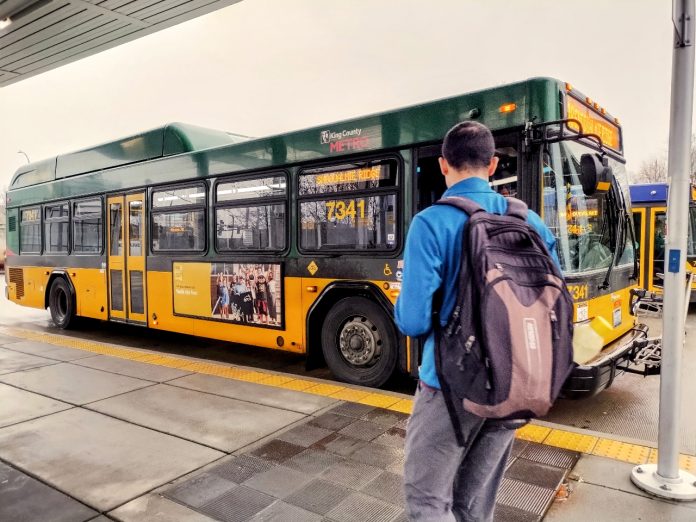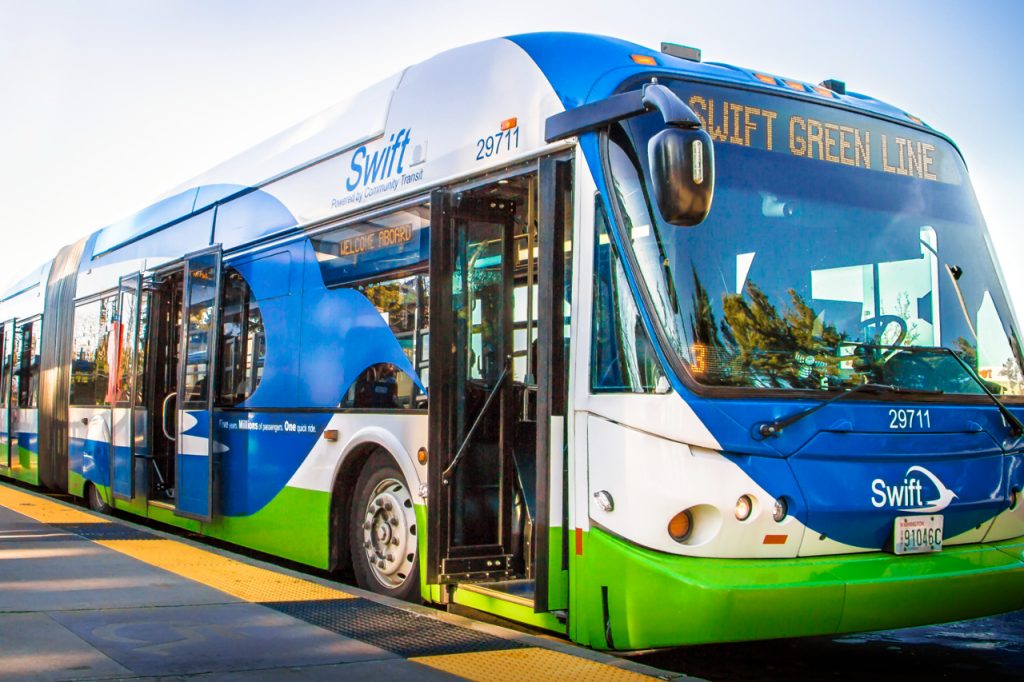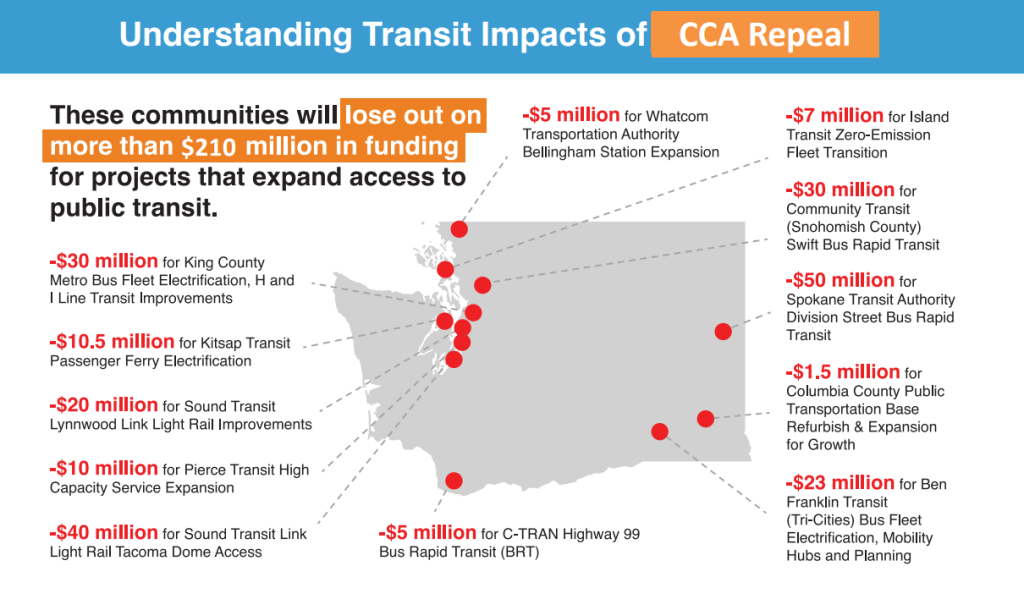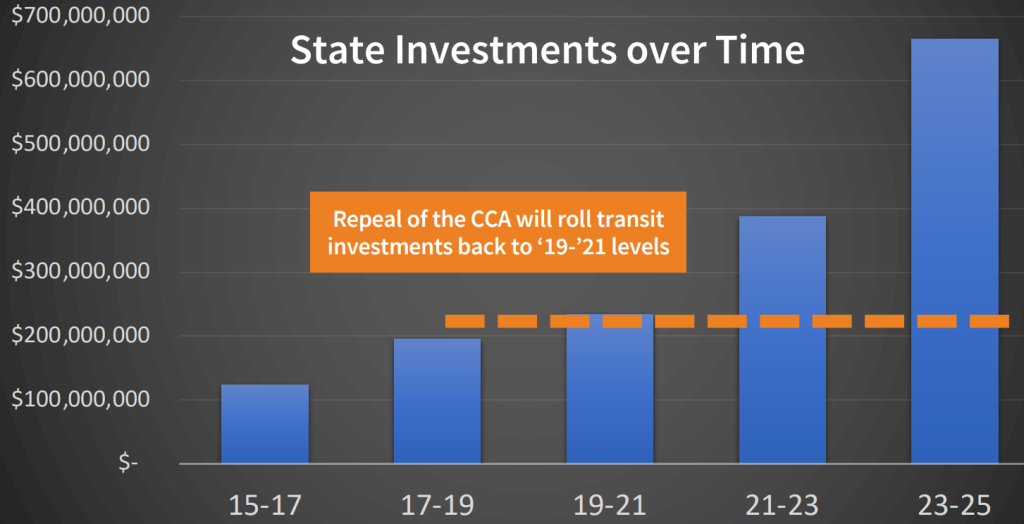
As Washington voters this fall face a decision on whether to repeal one of the most ambitious climate laws ever passed by a U.S. state, public transit agencies are spelling out significant impacts that could be in store for transit services and riders if that repeal is successful. If Initiative 2117 is approved by voters on November 5, it would repeal the heart of 2021’s Climate Commitment Act (CCA) and cut off a significant source of revenue for transportation projects around Washington State. It would also bar the state legislature from ever approving a carbon cap-and-trade system to reduce climate pollution in the future.
With transit funding one of the biggest recipients of funds from Climate Commitment Act carbon auctions, I-2117’s passage is likely to cause service cuts and cancellations and delays of transit improvements at agencies across the state, large and small. At a work session on the state transportation budget held by the state senate’s transportation committee held last week, Justin Leighton, the Executive Director of the Washington State Transit Association, called I-2117 the “biggest threat and risk factor” facing transit in Washington.
If CCA revenue evaporates, Leighton told legislators, $2.39 billion in funding over the next 16 years would be at risk. Most of that funding is included as part of 2022’s Move Ahead Washington transportation package, and it includes the largest direct state investment in transit service hours in decades, via the new Transit Support Grant program. To qualify for those grants, agencies had to adopt a zero-fare policy for riders 18 and under, a deal that every single agency in the state signed onto. Without the CCA, agencies wouldn’t have access to an anticipated $1.27 billion in support grants, and most agencies would likely return to charging for youth rides to recoup some of those costs.
Also at extreme risk would be $525 million for paratransit service and so-called “special needs” transportation services, $70 million for transit services serving Washington’s tribes and tribal lands, $262 million for bus facility upgrades and $262 million to help agencies transition their fleets to zero-emission vehicles. With state lawmakers already facing significant challenges in the coming years when it comes to balancing the state transportation budget, the prospect of these revenues being replaced by other sources in the near future appears dim — at best.

“This is a significant amount of money, that if the CCA is repealed, a lot of hard decisions will have to be made [at] our agencies about how they want to right-size our budgets,” Leighton said.
City governments from around the Puget Sound region have all started to weigh in on I-2117’s impact on their cities, when it comes to both city budgets and their ability to implement local carbon reduction plans. This week, Tacoma became the largest city in the state to have its City Council unanimously approve a resolution endorsing a “no” vote, following cities like Shoreline, Kirkland, Burien, and Redmond as well as the Port of Seattle Commission. But so far transit agencies have been relatively quiet, even though the impacts on their budgets would actually be much more significant.
Leighton showed legislators a map of transit upgrade projects around the state that are set to be funded by the CCA, including $50 million for Spokane Transit’s second planned bus rapid transit (BRT) line along Division Street, $30 million for the expansion of Community Transit’s Swift BRT system, including the planned Silver and Gold Lines and an extension of the Green Line to Downtown Bothell. $30 million is set to flow to King County Metro for bus electrification work, the RapidRide I Line, and unfinished improvements on the RapidRide H line.

The loss of CCA revenue wouldn’t be equally felt across the state’s 32 transit agencies. In August, Pierce Transit spelled out the direct impacts that it foresees if I-2117 is ultimately successful this November. The agency is particularly dependent on outside funding to expand service, given the fact that Pierce County hasn’t approved a local funding increase since 2002. The CCA is set to fund around 7.5% of Pierce Transit’s budget, and the agency would have few options to rely on if that funding were to evaporate.
“The agency likely would not be able to implement its Bus System Recovery Plan, slated to implement service improvements and expansion in phases over the next several years,” a Pierce Transit release noted. “Evening and weekend service and/or the frequency of how often buses arrive on certain routes may be reduced and/or not expanded.”
If I-2117 guts state funding for public transit, it won’t be the first time that transit investments have been decimated by a ballot initiative. In 1999, Tim Eyman’s I-695, implementing a $30 car tab and repealing the existing Motor Vehicle Excise Tax (MVET) was approved by voters. The MVET was the primary way that state government in Washington funded transit agencies at that time, with over a quarter of the total revenues raised by agencies around the state coming from the MVET in 1995. Despite a pending court ruling that could have invalidated I-695, the Democratic legislature enacted the initiative into law, blowing a gaping hole in the state budget, much of it impacting transit agencies.
State investment in the operating budgets of transit agencies has remained minimal since the early 2000’s, with no moves by the legislature to increase its level of support until the Move Ahead Washington package in 2022. If I-2117 were also enacted into law, that cycle would be set to start all over again, with few local revenue sources available to agencies, particularly those in areas where voters are not champing at the bit to increase sales taxes.

Ultimately, the impacts of I-2117’s passage would be felt far and wide across Washington state, worsening each mode of transportation. But transit riders would be left to bear a disproportionate burden from those impacts, even as they’re helping to reduce greenhouse gas emissions and traffic congestion. When Washington voters start to fill out their ballots in the coming weeks, whether they’d like to pull the rug out from under the state’s transit agencies is a big factor to consider.
Ryan Packer has been writing for The Urbanist since 2015, and currently reports full-time as Contributing Editor. Their beats are transportation, land use, public space, traffic safety, and obscure community meetings. Packer has also reported for other regional outlets including BikePortland, Seattle Met, and PubliCola. They live in the Capitol Hill neighborhood of Seattle.

